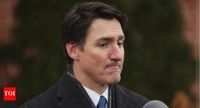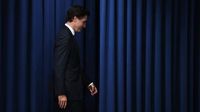NEW DELHI: The Indian government has signaled it is prepared to mend relations with Canada, which have soured recently due to allegations surrounding extremist groups operating from Canadian soil. In a press briefing, the Ministry of External Affairs spokesperson Randhir Jaiswal stated that the decline in diplomatic ties can be traced back to the prior administration under Prime Minister Justin Trudeau, which they accused of permitting extremist elements.
Speaking on March 21, 2025, Jaiswal emphasized, “The downturn in India-Canada relations was caused by the license that was given to the extremist and secessionist elements in the country. Our hope is that we can rebuild our ties based on mutual trust and sensitivity.” This marked a significant turn in diplomatic communications since relations had notably deteriorated over the previous months.
The tension between the two nations escalated dramatically after Trudeau accused Indian government agents of being involved in the assassination of Canadian citizen Hardeep Singh Nijjar, a prominent Sikh separatist leader, in British Columbia. This accusation, made in October 2024, sent both countries into a diplomatic crisis, resulting in the expulsion of senior diplomats from each nation.
Adding fuel to the fire, reports surfaced from Canada’s federal police claiming to have credible evidence that Indian agents were conducting illegal activities on Canadian soil, stirring a widespread outcry in India where national security was a deeply relied upon sentiment.
The strain reached a boiling point when protests erupted in Canada, particularly during a demonstration near a prominent Hindu temple in Brampton, Ontario. Armed individuals among the protestors prompted serious intervention from local police, illustrating the volatility surrounding issues of Khalistan, an Indian separatist movement that has gained notoriety in Canadian circles.
In response, India enacted measures that limited Canada’s diplomatic presence in the country, asserting that Canadian personnel were interfering in Indian affairs. External Affairs Minister S. Jaishankar pointed out that the relationship was in a precarious state, expressing the possibility of reviving visa issuance for Canadians contingent upon improvements ensuring the safety of Indian diplomats in Canada.
However, optimism for a thaw in relations has surfaced following the political upheaval in Canada; on January 6, 2025, Trudeau announced his resignation from the Liberal Party. Mark Carney, a former central banker and advocate for closer economic ties with India, took the reins as the new Prime Minister on March 15, 2025.
Carney expressed intentions to diversify Canada’s trading relationships and emphasized the importance of forging mutual values in trade partnerships, specifically mentioning opportunities to rebuild connections with India. In his first comments regarding diplomatic relations, he stated, “What Canada will be looking to do is to diversify our trading relationships with like-minded countries. And there are opportunities to rebuild the relationships with India- there needs to be a shared sense of values around that commercial relationship and if I am the Prime Minister, I look forward to the opportunity to build that.”
The landscape of Canada has changed dramatically since Carney took office, with leaders calling for a reconceptualization of Canadian identity amid the pressures of sovereignty and international relations. During his visit to Edmonton on March 20, he outlined funding plans and stressed the importance of Canadian culture and heritage, potentially steering a focus towards greater nationalist sentiments.
Mark Carney’s new approach showcases a marked departure from Trudeau's previous strategies. He aims to assert a stronger national identity, having already vowed to prioritize Canadian core values and identity against rising external influences, particularly from the United States.
As Canada steps into this new chapter, the implications of Carney’s leadership—especially regarding Canada-India relations—remain to be seen. The wounds inflicted during the previous administration will take time to heal, alongside the critical need for evidence-based diplomacy that ensures both nations can securely navigate their partnership moving forward.
Thus, despite the rocky road ahead, the Indian government has extended an olive branch while remaining cautious—a reflection of their national principles and the prevailing winds of international political sentiment. As Jaiswal stated, the aspiration is a renewed relationship grounded in “mutual trust and sensitivity,” which holds promise yet illustrates the complexities tied to political dynamics in a globally interconnected world.
With both nations navigating through the historic discord, the upcoming months will be crucial in determining the contours of India-Canada relations under a new leadership dynamic. It remains paramount that both sides seek an understanding rooted in respect to avert further incidents that could jeopardize this renewed effort.



